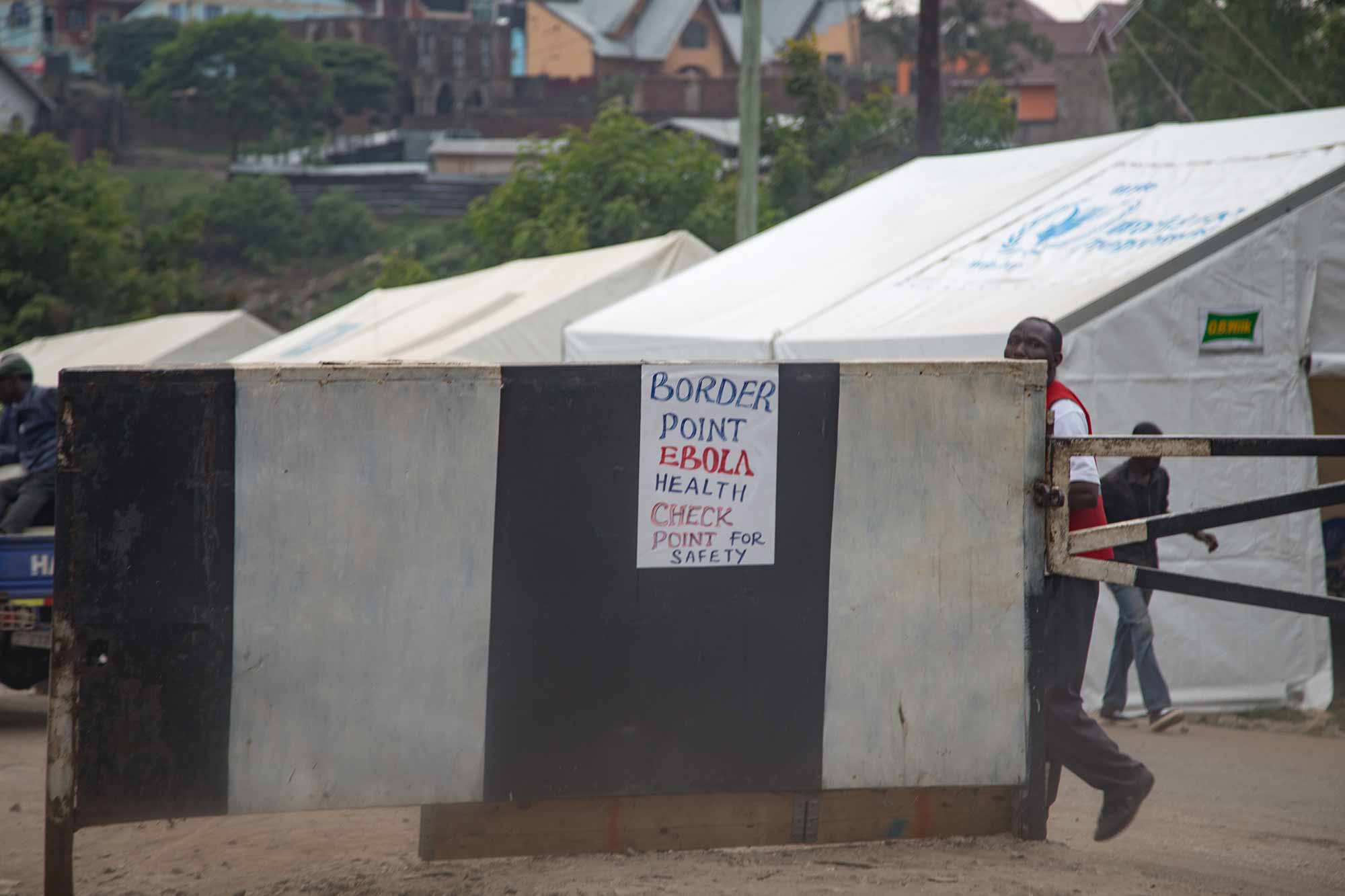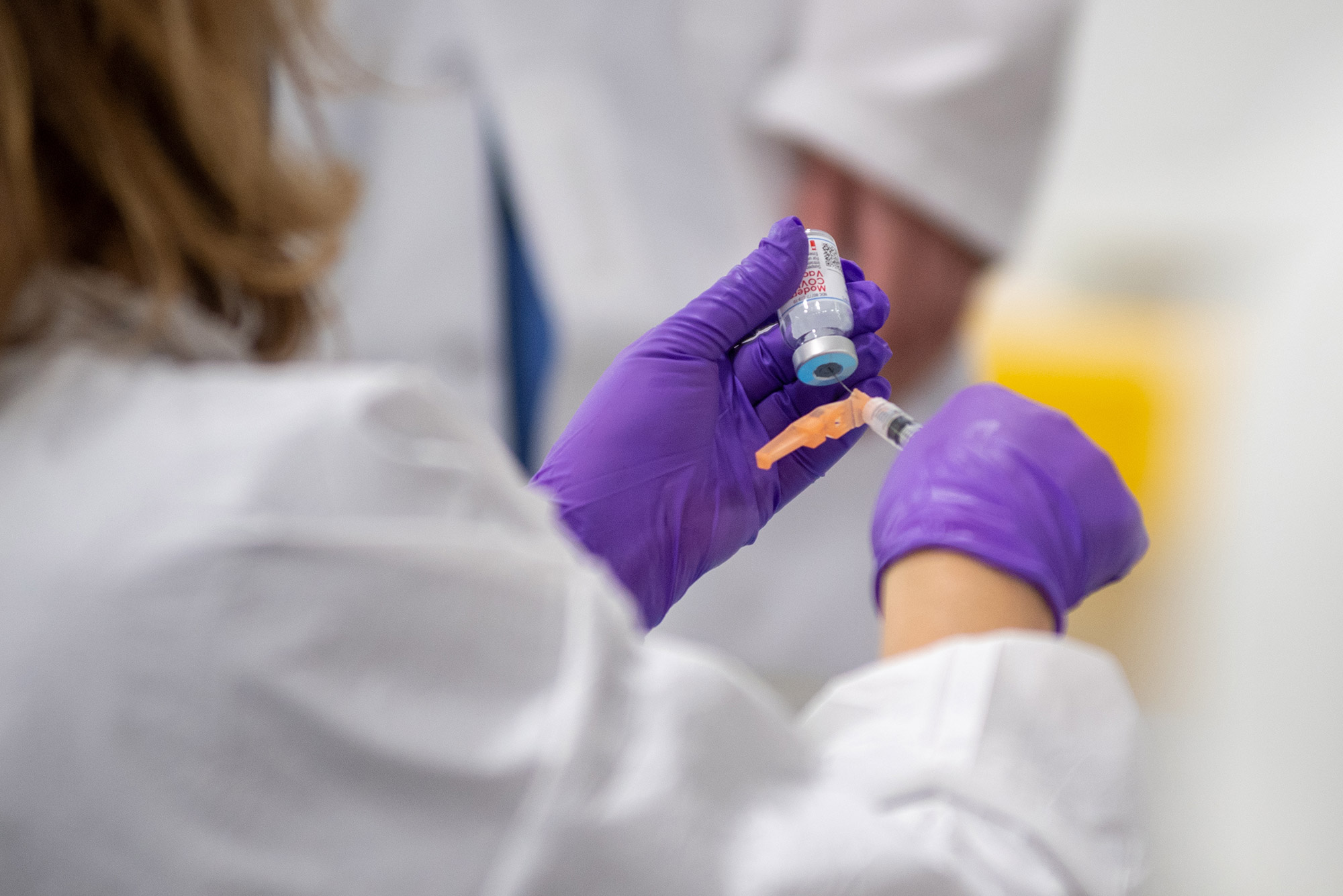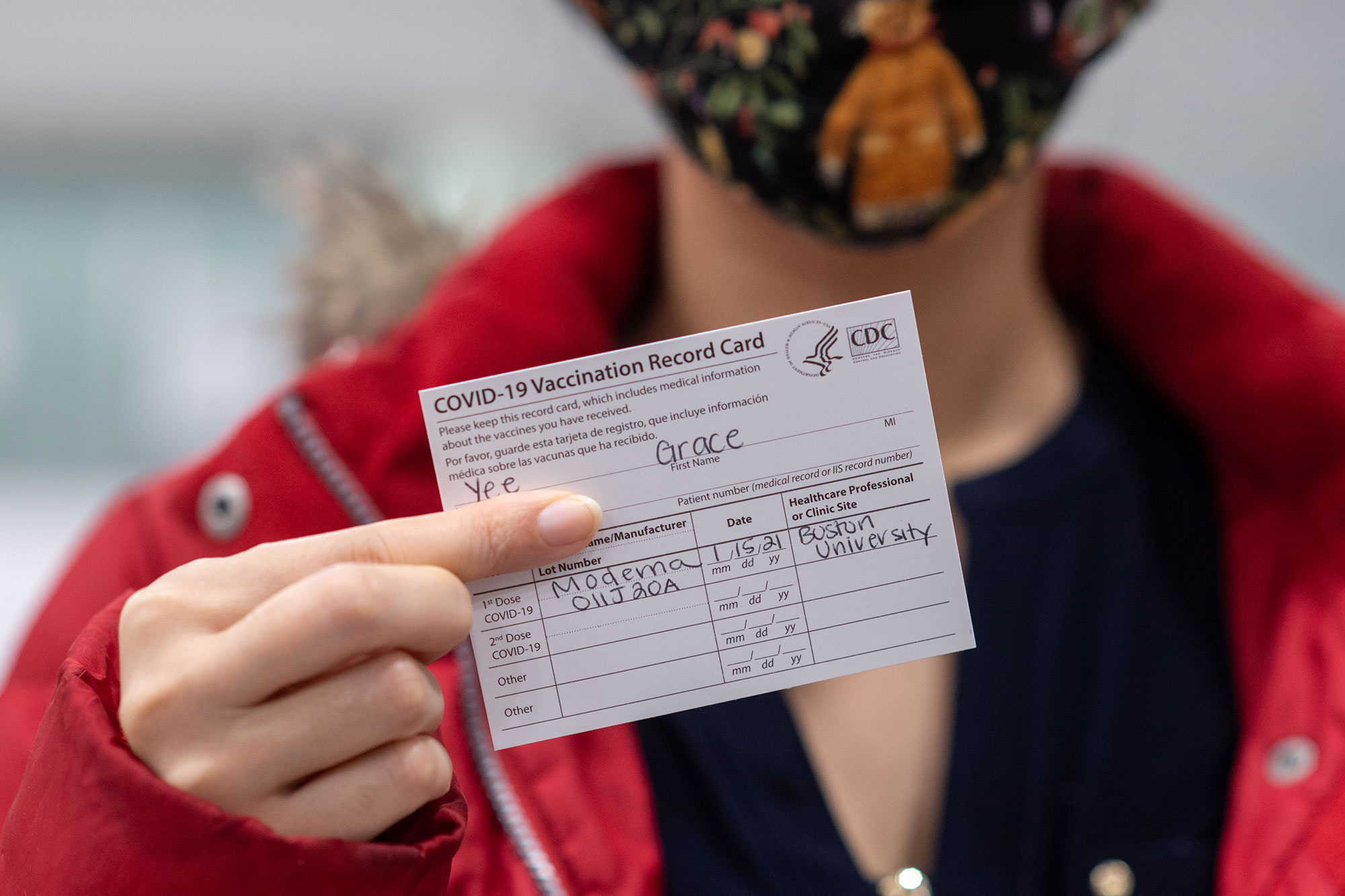Photo by Jackie Ricciardi
Infectious Diseases
Will connect policy with research and use lessons from Ebola and COVID to prepare lawmakers and the public for next crisis
The first-floor classroom is empty inside the Boston University School of Medicine on a gray and chilly May morning in the South End. The whiteboard is marked up from earlier instruction and the only sound is the hum of fluorescent lights overhead. With an audience of one, and from behind her blue mask, Nahid Bhadelia slips on one hat after another, pivoting seamlessly from healthcare policy wonk to infectious diseases physician to MED associate professor to expert researcher in highly communicable diseases.
Listening to her, it’s easy to see why Bhadelia is such a sought-after expert voice on the coronavirus pandemic—no question, no subject, is out of her comfort zone.
With so many roles, it’s difficult to imagine Bhadelia finding time for another. But, in fact, she’s poised to take on perhaps her most ambitious professional challenge yet. On June 1, BU will launch the Center for Emerging Infectious Diseases Policy & Research (CEID), with Bhadelia as its founding director. The center’s purpose is to marry technical expertise in emerging infectious diseases—like COVID-19, Zika, and Ebola—with policy research and to provide recommendations to governments, communities, and academic institutions to help them prepare, and respond to, epidemics and pandemics at local, national, and global levels.
It’s precisely the sort of multipronged, multidisciplinary center that was needed, say, back in January 2020, when news about this strange new, fast-spreading, deadly virus emerged from China. The public began asking questions about testing, wearing masks, handwashing, and contaminated surfaces, and public health experts began researching answers.
Bhadelia, who has lost three relatives to the coronavirus, says the new center will be “a place we work to answer the known unknowns when a crisis happens and we build evidence for how we keep ourselves safe and keep the next big one from happening.”
“COVID-19 has taught us that a truly effective response to a pandemic must be based on science and sound government policy. With Professor Bhadelia’s leadership and the research in the NEIDL, Boston University is well positioned to lead at this critical interface.”
Photo by Cydney Scott
“I think the center would have helped [in early 2020],” she says. “It would have been there to create just-in-time policy for legislators, to say, hey, here is a two-page brief that can help you understand what the science behind the big topics and policy implications are. It would have been a place for the public to go to get evolving scientific information, and a place where multidisciplinary researchers can determine best practices for responding to this crisis from a healthcare perspective.”
Bhadelia, who is also being named an associate director at BU’s National Emerging Infectious Diseases Laboratories (NEIDL), stresses that the center will not be the “source of all knowledge,” and much of its foundation is still taking shape. The center will be closely aligned with NEIDL. One of just six Biosafety Level 4 laboratories around the United States, NEIDL’s mission is to help deal with exceedingly dangerous diseases like Ebola. The CEID will live on the fourth floor of NEIDL.
“I feel like we’re building a ship while sailing it,” Bhadelia says. “If NEIDL is the ‘wet lab’ and the ‘what’ of responding to emerging pathogens—by discovering diagnostics, vaccines, and therapeutics—then CEID is the ‘dry lab’ and the ‘how’ of responding to these types of threats—by determining the implications of events, technologies, policies, and interventions.”
The center will serve as the catalyst for creating and sharing the most important and accurate knowledge with public health experts, lawmakers, decision-makers, and the general public, at a time when facts and falsehoods have too often blurred together to cause confusion and frustration. “One of the biggest surprises to me is how much misinformation and disinformation is out there,” Bhadelia says. “I hope the center will contribute research on what is the best way to depoliticize scientific data during outbreaks.”
As for the timing of the center’s launch, the charter document for CEID, which Bhadelia wrote, says it all: “The threat of pandemics will not end with COVID-19.”
Lessons from Ebola
For Bhadelia, who is 43, the opportunity to head a leading academic center with a global health mission is a natural step in a career built around the fight against, and the research into, dangerous pathogens. She’s an American who was born in India, grew up in Sweden and Saudi Arabia, and came to the United States as a young teenager (her father was a world-traveling physician)—all experiences that helped shape her passion for, and understanding of, how healthcare is accessed by people in different countries and circumstances.
In addition to her bachelor’s degree from Tufts University, she has a master’s degree in international affairs from the Fletcher School at Tufts (her thesis topic was how HIV/AIDS impacted the economic productivity in many sub-Saharan African countries).
It was her background understanding both policy and pathogens that helped her land at BU in 2011, as director of medical response to maximum containment research at NEIDL.
“COVID-19 has taught us that a truly effective response to a pandemic must be based on science and sound government policy,” BU President Robert A. Brown says. “With Professor Bhadelia’s leadership and the research in the NEIDL, Boston University is well positioned to lead at this critical interface.”
Bhadelia has built from the ground up a Special Pathogens Unit at BMC that specializes in the care of highly communicable infectious diseases, serving as its medical director. Photos courtesy of Nahid Bhadelia
Ronald Corley, director of the NEIDL and a MED professor and chair of microbiology, adds that it is impossible to predict where and when the next infectious disease outbreak will occur, making the center’s role even more imperative. “Having data-driven policies informing these responses can mitigate the impact of the outbreak beginning at its earliest detection,” Corley says. “Dr. Bhadelia and the CEID will play a critical role in establishing these policies.”
Over the last 10 years, Bhadelia has built from the ground up a medical unit that specializes in the care of highly communicable infectious diseases, serving as its medical director. The Special Pathogens Unit (SPU) is situated within Boston Medical Center (BMC), BU’s primary teaching hospital. Her work has involved everything from engineering and infection control to training hundreds of associated healthcare workers, developing clinical care policies, and taking part in national conversations about how we develop and stockpile treatments for emerging diseases. When COVID-19 hit Boston in early 2020, SPU nurses and the associated BMC floor were the first responders to the crisis, forming the front line for providing care for patients and contributing to the training of other parts of the hospital.

Ebola virus disease (EVD) is what drew Bhadelia to visit West Africa in 2014. Her work there over multiple trips caring for Ebola patients and working alongside healthcare workers helped shape her thinking for the role that the CEID should play. She traveled to Sierra Leone to serve on a World Health Organization team, caring for hundreds of Ebola patients. Working in so-called hot zones over several trips, and covered head to toe in a biohazard safety suit, she moved in and out of wards caring for patients, astounded on a daily basis by both the terrible toll of the disease and the bravery of the workers trying to contain it and console victims and families. Over these four trips, she also helped identify techniques for healthcare workers to protect themselves from contamination against dangerous diseases and worked with Ebola survivors.
In her work with Ebola patients and healthcare workers, Bhadelia, who also takes photographs in her travels as a hobby, saw the struggles in understanding how the disease could be spread, the misery in seeing patients isolated and depressed, the slow economic and cultural recovery after an infectious disease crisis, and the politics of how to keep it from spreading globally. Those issues all resurfaced in the past year with COVID-19.
Since the West African EVD epidemic, Bhadelia has continued her work with viral hemorrhagic fever. She helped found and now codirects the National Institutes of Health–funded Boston University and University of Liberia Emerging and Epidemic Virus Research Program, which aims to provide Liberian researchers with a PhD at BU. “We need the global research agenda to be driven by researchers in communities that are most heavily affected by many of these emerging pathogens,” she says.
“How do you improve mental health, you know, in recovery, in patients who are isolated?” Bhadelia asks. Photos courtesy of Nahid Bhadelia
Bhadelia has also been working in Uganda for the last three years as the clinical lead of a viral hemorrhagic fever research unit, called Joint Mobile Emerging Disease Intervention Clinical Capability (JMEDICC), at the border of the Democratic Republic of the Congo (DRC). “We have been part of the Ugandan response to the last couple of EVD outbreaks in DRC,” she says. “The goal is to improve the care of patients with these types of infections.”
In fact, after witnessing the 2014 Ebola epidemic, improving patient care has been her burning mission.
“How do you improve mental health, you know, in recovery, in patients who are isolated?” Bhadelia asks. “This is not just about this pandemic. We went through that with Ebola—patients being isolated, their families not being able to connect with them. We tackled how to provide the best quality of care while keeping healthcare workers safe. We dealt with the legacy of loss for communities. It’s important that we’re not reinventing the wheel every single time there’s a new spread. And we have to figure out how to take politics out of the response.”
And the research has to be ongoing, even after a disease has been contained.
“We just learned that Ebola survivors can potentially pass on the disease five or six years after recovering,” she says. “What are the implications of this finding to keeping them and their communities safe? How do we avoid the potential stigma they may face, if this is confirmed?”
Helping research drive policy
Four themes will drive the work at CEID, Bhadelia says: resilience among communities and healthcare systems, governance, trust, and innovation.
“What sets CEID apart is that it connects policy research to deep scientific technical expertise,” she says.
“Dr. Bhadelia has been our clinical and policy expert on emerging infectious diseases, such as Ebola and Zika, in the last few years, and now the COVID-19 outbreak, both for us and for the public,” says Karen Antman, dean of MED and provost of the Medical Campus. “She is able to translate complicated epidemiology and policy so the public readily understands it. Her leadership will drive this new center.”
Bhadelia expects to hire a few people to start, focusing on finance, administrative needs, and communications. And she envisions working with partners to create a fellowship program, specifically offering opportunities for midcareer professionals or those interested in government work to gain firsthand experience in infectious diseases research and patient care.
Having data-driven policies informing these responses can mitigate the impact of the outbreak beginning at its earliest detection. Dr. Bhadelia and the CEID will play a critical role in establishing these policies.
Photo by Cydney Scott
“Wouldn’t it be incredible if people who make policies also got a deep dive and understanding of biocontainment research, like what is conducted at NEIDL, and the challenges of providing care for patients with highly communicable diseases by experiencing the work of healthcare workers who are part of the Special Pathogens Unit?” Bhadelia says.
The biggest opportunities she sees are capitalizing on BU’s multidisciplinary approach, teaming with faculty from the College of Engineering, the Center for Antiracist Research, the College of Communication, the School of Law, the Frederick S. Pardee School of Global Studies, the School of Public Health, NEIDL, the Questrom School of Business, and possibly others. And those who become affiliated faculty with CEID, she says, would get resources to accelerate their work and apply for grants.
“This initiative is timely and is perfectly aligned with the diverse strengths of Boston University,” NEIDL’s Corley says. “We should use the lessons from the ongoing COVID-19 pandemic—what did we do right? What did we do wrong? And how can we improve? The solutions can only come by melding considerations from diverse disciplines, including public health, political science, and economics, as well as research on the pathogens that cause these diseases, and implementing them locally and globally.”
New pathogens seem to be emerging almost every year somewhere in the world, Bhadelia says. Before COVID-19, there was Ebola and Zika and H1N1, mysterious diseases from other parts of the world that briefly, and in relatively small numbers, touched American lives. The coronavirus was different, so far killing almost 600,000 Americans, more than 3 million worldwide, and causing a global pandemic. The coronavirus was the first one that affected everybody.
“I would say the need [for the center] has been there for a while,” Bhadelia says. “I think that what changed was people’s ability to see that it’s relevant, because now it’s relevant to their own lives, right? They have lived experiences of how vulnerable we are to these threats.”
Nahid Bhadelia has identified several people who will be core members of the CEID faculty: Kevin P. Gallagher, a Pardee School of Global Studies professor of global development policy; Kevin Outterson, a School of Law professor of health law and corporate law; Traci Hong, a College of Communication associate professor of media science; Gerald Keusch, a MED professor of medicine and of international health; David Hamer, a MED professor of global health and medicine; Cassandra Pierre, a MED assistant professor of medicine, and Boston Medical Center’s associate hospital epidemiologist and medical director of public health programs; Eleanor Murray, a School of Public Health assistant professor of epidemiology; Laura White, an SPH associate professor of biostatistics; and Gianluca Stringhini, a College of Engineering assistant professor of electrical and computer engineering.
Explore Related Topics:
"center" - Google News
May 19, 2021 at 08:03AM
https://ift.tt/33Xbg7H
Nahid Bhadelia to Head New BU Center for Emerging Infectious Diseases Policy and Research - BU Today
"center" - Google News
https://ift.tt/3bUHym8
https://ift.tt/2zR6ugj
Bagikan Berita Ini
















0 Response to "Nahid Bhadelia to Head New BU Center for Emerging Infectious Diseases Policy and Research - BU Today"
Post a Comment